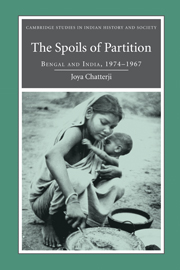Book contents
- Frontmatter
- Contents
- List of maps and illustration
- List of tables
- List of abbreviations
- Glossary
- Preface and acknowledgements
- Introduction
- Part I Hopes and fears
- Part II The Bengal diaspora
- Part III The politics of a partitioned state
- 5 Political reconstruction and change: Congress government and politics, 1947–1967
- 6 The revenge of the periphery: the rise of the opposition in West Bengal
- Conclusion
- Appendix
- Bibliography
- Index
6 - The revenge of the periphery: the rise of the opposition in West Bengal
Published online by Cambridge University Press: 25 June 2009
- Frontmatter
- Contents
- List of maps and illustration
- List of tables
- List of abbreviations
- Glossary
- Preface and acknowledgements
- Introduction
- Part I Hopes and fears
- Part II The Bengal diaspora
- Part III The politics of a partitioned state
- 5 Political reconstruction and change: Congress government and politics, 1947–1967
- 6 The revenge of the periphery: the rise of the opposition in West Bengal
- Conclusion
- Appendix
- Bibliography
- Index
Summary
Partition, as intended, gave West Bengal a Congress ministry. But while the factions which took office continued single-mindedly to pursue their own self-interest, the political world around them was rapidly changing. On both sides of the house in West Bengal, there were winners and losers in the turbulent aftermath of partition.
During these two decades, the Communist Party of India and its offshoot, the Communist Party (Marxist), made large gains in West Bengal at the Congress's expense. This was an outcome which no one could have predicted in 1947. However much intellectuals on the left might claim that class consciousness had grown, and was continuing to grow among the workers, the fact was that in the neighbourhoods and on the shop-floors where the labouring poor lived and worked, Hindu–Muslim conflict in the 1940s had shattered many of the solidarities that the Communists had succeeded in building. Nor was smouldering communal discord after partition a propitious climate for parties committed to radical secularism. An observer of the political scene in 1947 might, with good cause, have expected the Hindu Mahasabha to do best out of partition; and yet, for reasons that need to be explored, the Mahasabha in West Bengal collapsed, while the Communists went from strength to strength.
Partition and its consequences are the key to these surprising developments.
- Type
- Chapter
- Information
- The Spoils of PartitionBengal and India, 1947–1967, pp. 260 - 309Publisher: Cambridge University PressPrint publication year: 2007



